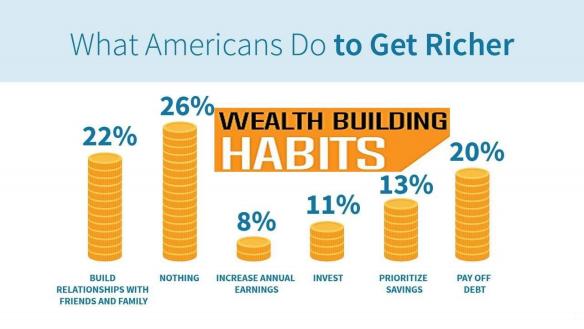
Building wealth doesn't require one with money; it requires most commitment to a
long-term process. Creating smart financial habits will pave the ground that may lead to long-term financial success. Here are five key wealth-building habits to cultivate as you begin today.
1. Save Consistently
First and foremost habit is savings. Bringing home some money is not very big;
what's big is that you save some of it regularly. Saving sets aside a financial cushion, prepares for emergencies, and opens up investment possibilities.
Action to Take:
Auto-Savings: Transfers money from the checking account to a savings account at regular or designated intervals.
Save first: Save before spending on things that aren't basic.
Do something little: This is not to say you need to save much money, but
everything counts in the long run.
Benefits of Saving
• You have some savings you can always use for emergency situations.
• Saving gives one enough working capital for investment options
• Everybody will sleep well knowing that you have a fall-back position should things go awry
2. Spend Below Your Means
Spending below your means will save wealth. This means spending less than
earning, no inflation of lifestyle, and achieving long-term goals and not instant
gratification. People who live below their means have more space to maneuver when saving and investing thus hastening their paths to wealth.
How to Live Below Your Means
Create a budget: Know how you spend your money and avoid impulse buying.
No loan burden: Pay the credit card fully each month and avoid unnecessary loan burdens.
Depressurize lifestyles: Reduce the necessity of indulging in wants rather than needs. Get rid of the urge to spend just to please others.
3. Invest Regularly
Perhaps the best way to save is through an investment account. According to the compound interest law, the longer your money works for you, the better. Small, regular investments can also turn into big fortunes in due course of time.

How Do I Get Started Investing?
Set financial goals: Decide for what purpose you are investing, maybe your retirement, education, or some other long-term goal.
Diversification Portfolio: Investing in the diversified portfolio of asset classes like shares, debt instruments or properties, and thereby even diversified the risk.
Employer-sponsored plans: Retirement accounts such as 401(k) or IRA also carry tax benefits and, here again, you receive employer's match.
Bottom Line:
• You are better off the longer money has to grow.
• Long-term growth is preferable rather than trying to pick a market.
4. Continuous Learning in Personal Finance
In building wealth, knowledge begets power. The amount that is individual learns about personal finance, investing, and money management would empower him or
her for his or her financial decisions. Trends, therefore, shall be updated while exposed to vast options of investments and rising levels of financial literacy.

How to Learn:
Read books on personal finance. Two of the best classical books on personal finance are "The Richest Man in Babylon" and "Rich Dad Poor Dad".
Listen to podcasts and watch videos. There is such great, educational content on personal finance made simple for us.
Talk with a financial advisor. Seek professional opinions that will help you make even more fruitful decisions based on your unique circumstances.
5. Reaching Long Term Financial Goals
Set long-term financial goals. It gives you direction and motivation toward making
disciplined choices because you know where you are going. For instance, it could be preparing for retirement, a down payment on a house, or even starting your own
business. More defined objectives will give context to your focused attention.
How to Set Up Financial Goals
Make a goal for yourself and be clear about what you hope to obtain. Perhaps you would like to retire by the time you are 65 years old and require saving 1 million
dollars.
Divide the goal: big goals can be divided into smaller goals that can become more manageable.
Conclusion:
A person does not get rich overnight, but if you find some time and live with discipline, you can successfully enter the right path by adopting these five habits. If you save
regularly, you live below your means, invest regularly, educate yourself on personal finance, and set clear goals, then you'll be able to build a strong basis to support
long-lasting financial success. Start now for a better future.






